HEAL6010: Comprehensive Report on UK Healthcare System Performance
VerifiedAdded on 2023/01/11
|12
|4347
|90
Report
AI Summary
This report provides a comprehensive analysis of the UK healthcare system, focusing on its organization, performance, and the influence of the WHO building block framework. The report begins with an executive summary and introduction, defining the healthcare system and highlighting the UK's efficient, government-sponsored National Health Service (NHS). It then describes the WHO building block framework, including service delivery, health workforce, information, medical products, financing, and leadership and governance, detailing how these blocks function within the UK system. The report examines the goals of the UK healthcare system, which aim to improve service quality, expand accessibility, and provide fairer funding. It further analyzes the functions of the UK health system, including various organizations and programs. The report then discusses the limitations of the WHO framework and assesses the UK's health system performance, considering the Universal Health Coverage (UHC) concept and overall system performance. The assignment is a response to the HEAL6010 module, and it assesses the performance of the UK's healthcare system.
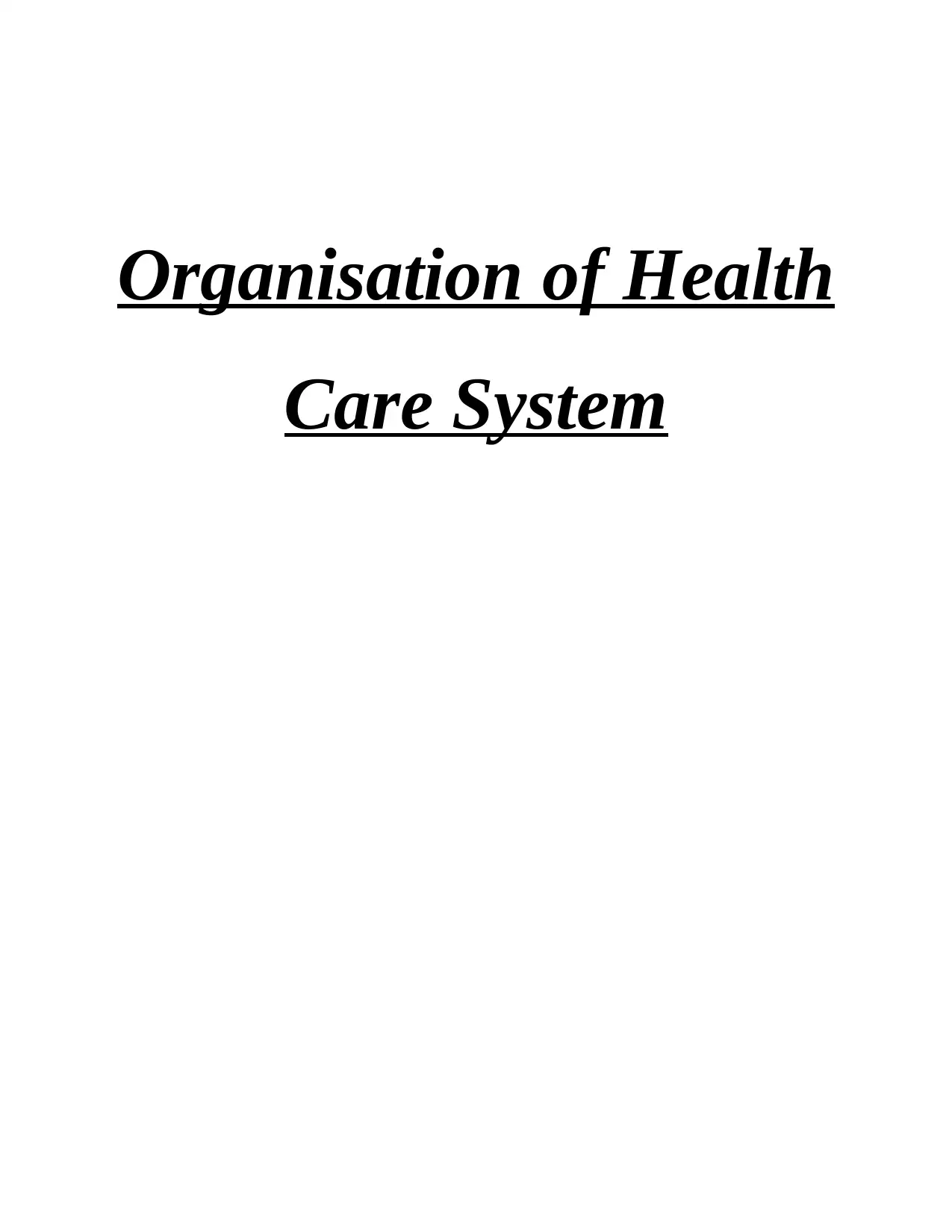
Organisation of Health
Care System
Care System
Paraphrase This Document
Need a fresh take? Get an instant paraphrase of this document with our AI Paraphraser
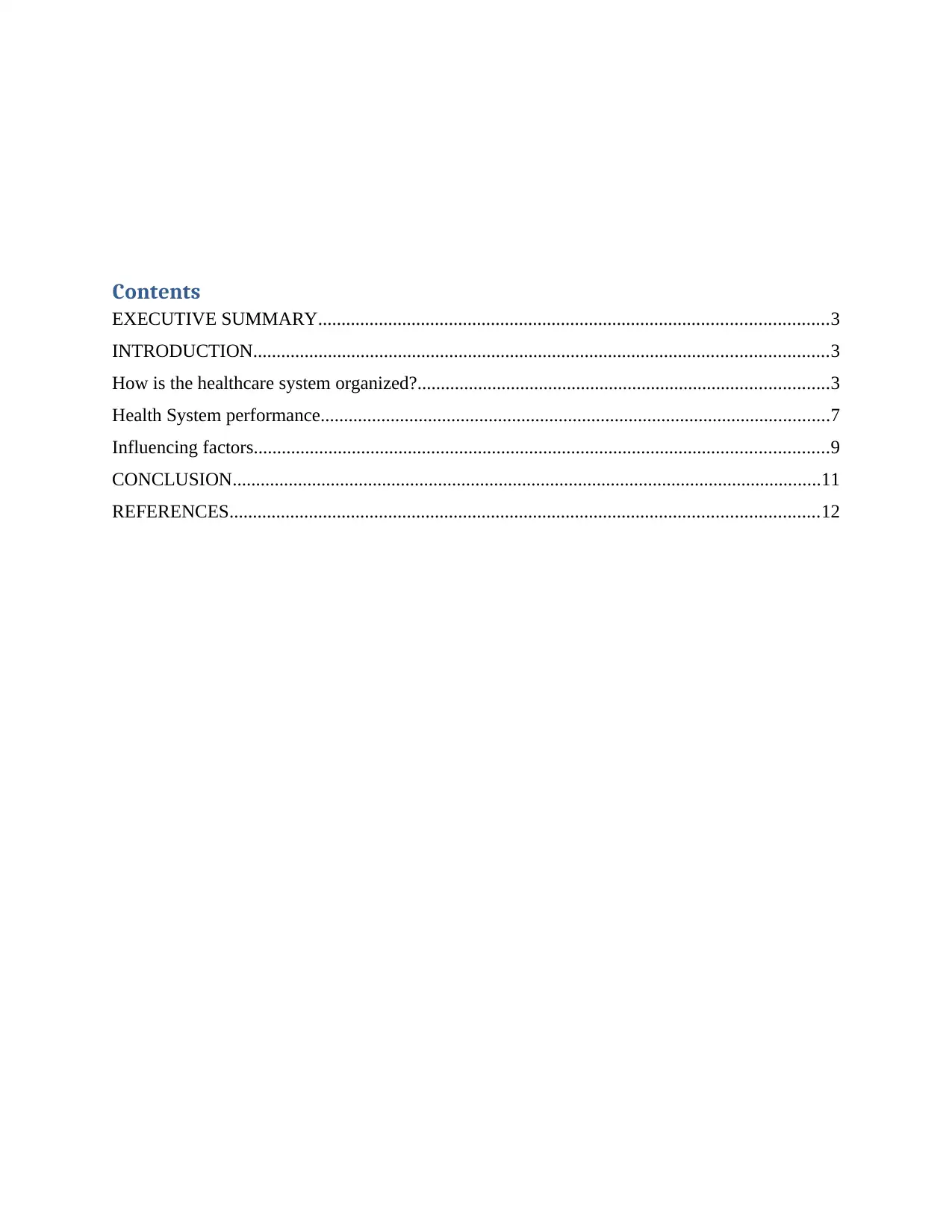
Contents
EXECUTIVE SUMMARY.............................................................................................................3
INTRODUCTION...........................................................................................................................3
How is the healthcare system organized?........................................................................................3
Health System performance.............................................................................................................7
Influencing factors...........................................................................................................................9
CONCLUSION..............................................................................................................................11
REFERENCES..............................................................................................................................12
EXECUTIVE SUMMARY.............................................................................................................3
INTRODUCTION...........................................................................................................................3
How is the healthcare system organized?........................................................................................3
Health System performance.............................................................................................................7
Influencing factors...........................................................................................................................9
CONCLUSION..............................................................................................................................11
REFERENCES..............................................................................................................................12
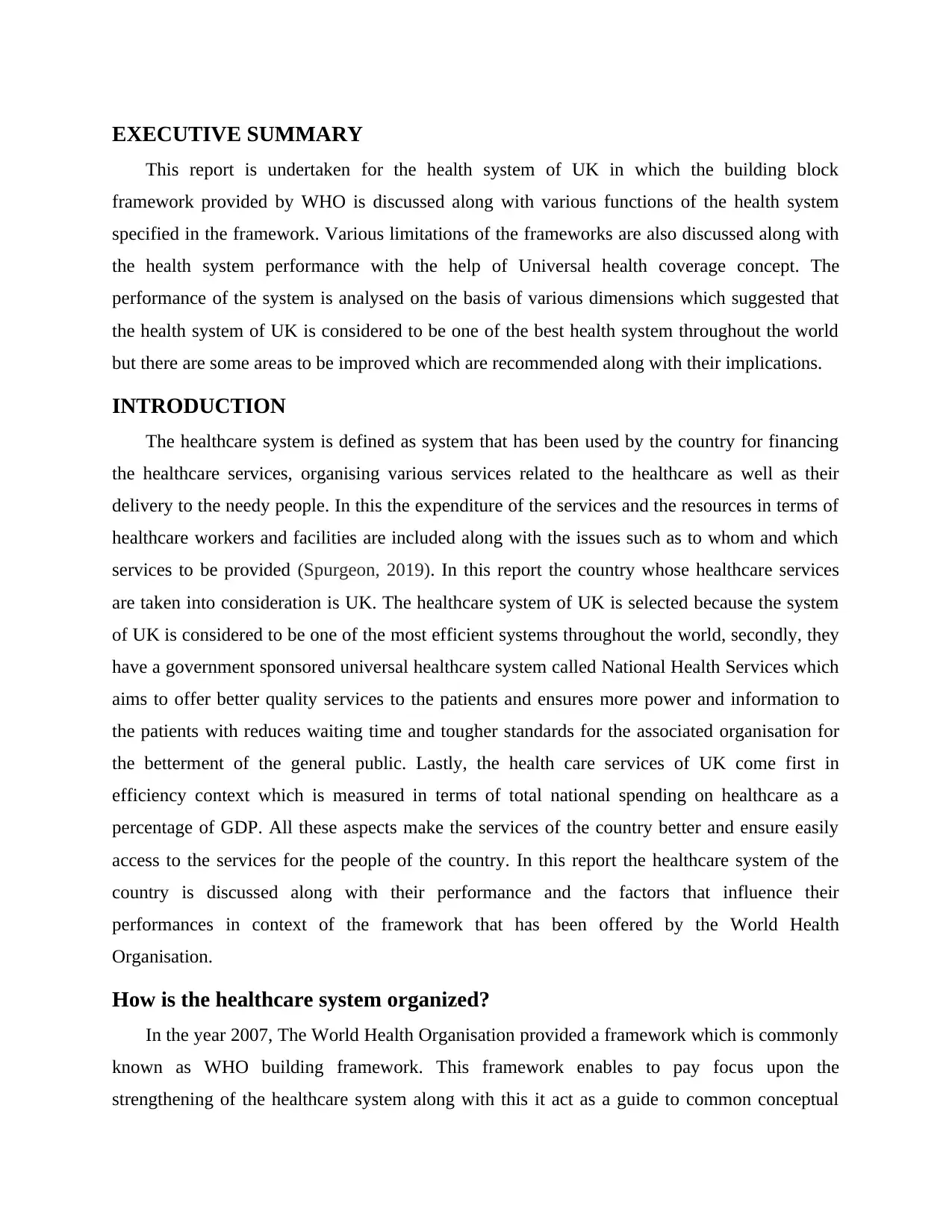
EXECUTIVE SUMMARY
This report is undertaken for the health system of UK in which the building block
framework provided by WHO is discussed along with various functions of the health system
specified in the framework. Various limitations of the frameworks are also discussed along with
the health system performance with the help of Universal health coverage concept. The
performance of the system is analysed on the basis of various dimensions which suggested that
the health system of UK is considered to be one of the best health system throughout the world
but there are some areas to be improved which are recommended along with their implications.
INTRODUCTION
The healthcare system is defined as system that has been used by the country for financing
the healthcare services, organising various services related to the healthcare as well as their
delivery to the needy people. In this the expenditure of the services and the resources in terms of
healthcare workers and facilities are included along with the issues such as to whom and which
services to be provided (Spurgeon, 2019). In this report the country whose healthcare services
are taken into consideration is UK. The healthcare system of UK is selected because the system
of UK is considered to be one of the most efficient systems throughout the world, secondly, they
have a government sponsored universal healthcare system called National Health Services which
aims to offer better quality services to the patients and ensures more power and information to
the patients with reduces waiting time and tougher standards for the associated organisation for
the betterment of the general public. Lastly, the health care services of UK come first in
efficiency context which is measured in terms of total national spending on healthcare as a
percentage of GDP. All these aspects make the services of the country better and ensure easily
access to the services for the people of the country. In this report the healthcare system of the
country is discussed along with their performance and the factors that influence their
performances in context of the framework that has been offered by the World Health
Organisation.
How is the healthcare system organized?
In the year 2007, The World Health Organisation provided a framework which is commonly
known as WHO building framework. This framework enables to pay focus upon the
strengthening of the healthcare system along with this it act as a guide to common conceptual
This report is undertaken for the health system of UK in which the building block
framework provided by WHO is discussed along with various functions of the health system
specified in the framework. Various limitations of the frameworks are also discussed along with
the health system performance with the help of Universal health coverage concept. The
performance of the system is analysed on the basis of various dimensions which suggested that
the health system of UK is considered to be one of the best health system throughout the world
but there are some areas to be improved which are recommended along with their implications.
INTRODUCTION
The healthcare system is defined as system that has been used by the country for financing
the healthcare services, organising various services related to the healthcare as well as their
delivery to the needy people. In this the expenditure of the services and the resources in terms of
healthcare workers and facilities are included along with the issues such as to whom and which
services to be provided (Spurgeon, 2019). In this report the country whose healthcare services
are taken into consideration is UK. The healthcare system of UK is selected because the system
of UK is considered to be one of the most efficient systems throughout the world, secondly, they
have a government sponsored universal healthcare system called National Health Services which
aims to offer better quality services to the patients and ensures more power and information to
the patients with reduces waiting time and tougher standards for the associated organisation for
the betterment of the general public. Lastly, the health care services of UK come first in
efficiency context which is measured in terms of total national spending on healthcare as a
percentage of GDP. All these aspects make the services of the country better and ensure easily
access to the services for the people of the country. In this report the healthcare system of the
country is discussed along with their performance and the factors that influence their
performances in context of the framework that has been offered by the World Health
Organisation.
How is the healthcare system organized?
In the year 2007, The World Health Organisation provided a framework which is commonly
known as WHO building framework. This framework enables to pay focus upon the
strengthening of the healthcare system along with this it act as a guide to common conceptual
⊘ This is a preview!⊘
Do you want full access?
Subscribe today to unlock all pages.

Trusted by 1+ million students worldwide
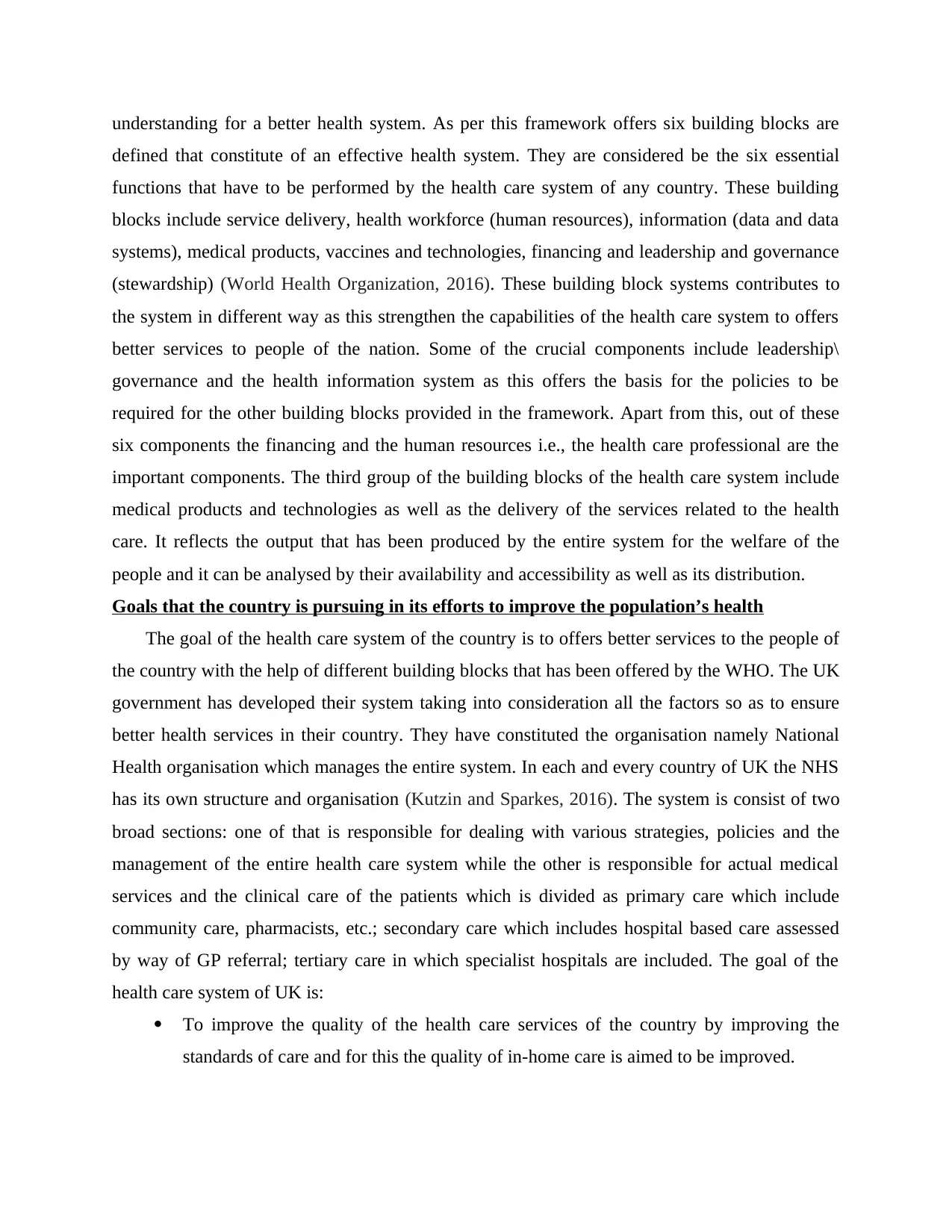
understanding for a better health system. As per this framework offers six building blocks are
defined that constitute of an effective health system. They are considered be the six essential
functions that have to be performed by the health care system of any country. These building
blocks include service delivery, health workforce (human resources), information (data and data
systems), medical products, vaccines and technologies, financing and leadership and governance
(stewardship) (World Health Organization, 2016). These building block systems contributes to
the system in different way as this strengthen the capabilities of the health care system to offers
better services to people of the nation. Some of the crucial components include leadership\
governance and the health information system as this offers the basis for the policies to be
required for the other building blocks provided in the framework. Apart from this, out of these
six components the financing and the human resources i.e., the health care professional are the
important components. The third group of the building blocks of the health care system include
medical products and technologies as well as the delivery of the services related to the health
care. It reflects the output that has been produced by the entire system for the welfare of the
people and it can be analysed by their availability and accessibility as well as its distribution.
Goals that the country is pursuing in its efforts to improve the population’s health
The goal of the health care system of the country is to offers better services to the people of
the country with the help of different building blocks that has been offered by the WHO. The UK
government has developed their system taking into consideration all the factors so as to ensure
better health services in their country. They have constituted the organisation namely National
Health organisation which manages the entire system. In each and every country of UK the NHS
has its own structure and organisation (Kutzin and Sparkes, 2016). The system is consist of two
broad sections: one of that is responsible for dealing with various strategies, policies and the
management of the entire health care system while the other is responsible for actual medical
services and the clinical care of the patients which is divided as primary care which include
community care, pharmacists, etc.; secondary care which includes hospital based care assessed
by way of GP referral; tertiary care in which specialist hospitals are included. The goal of the
health care system of UK is:
To improve the quality of the health care services of the country by improving the
standards of care and for this the quality of in-home care is aimed to be improved.
defined that constitute of an effective health system. They are considered be the six essential
functions that have to be performed by the health care system of any country. These building
blocks include service delivery, health workforce (human resources), information (data and data
systems), medical products, vaccines and technologies, financing and leadership and governance
(stewardship) (World Health Organization, 2016). These building block systems contributes to
the system in different way as this strengthen the capabilities of the health care system to offers
better services to people of the nation. Some of the crucial components include leadership\
governance and the health information system as this offers the basis for the policies to be
required for the other building blocks provided in the framework. Apart from this, out of these
six components the financing and the human resources i.e., the health care professional are the
important components. The third group of the building blocks of the health care system include
medical products and technologies as well as the delivery of the services related to the health
care. It reflects the output that has been produced by the entire system for the welfare of the
people and it can be analysed by their availability and accessibility as well as its distribution.
Goals that the country is pursuing in its efforts to improve the population’s health
The goal of the health care system of the country is to offers better services to the people of
the country with the help of different building blocks that has been offered by the WHO. The UK
government has developed their system taking into consideration all the factors so as to ensure
better health services in their country. They have constituted the organisation namely National
Health organisation which manages the entire system. In each and every country of UK the NHS
has its own structure and organisation (Kutzin and Sparkes, 2016). The system is consist of two
broad sections: one of that is responsible for dealing with various strategies, policies and the
management of the entire health care system while the other is responsible for actual medical
services and the clinical care of the patients which is divided as primary care which include
community care, pharmacists, etc.; secondary care which includes hospital based care assessed
by way of GP referral; tertiary care in which specialist hospitals are included. The goal of the
health care system of UK is:
To improve the quality of the health care services of the country by improving the
standards of care and for this the quality of in-home care is aimed to be improved.
Paraphrase This Document
Need a fresh take? Get an instant paraphrase of this document with our AI Paraphraser
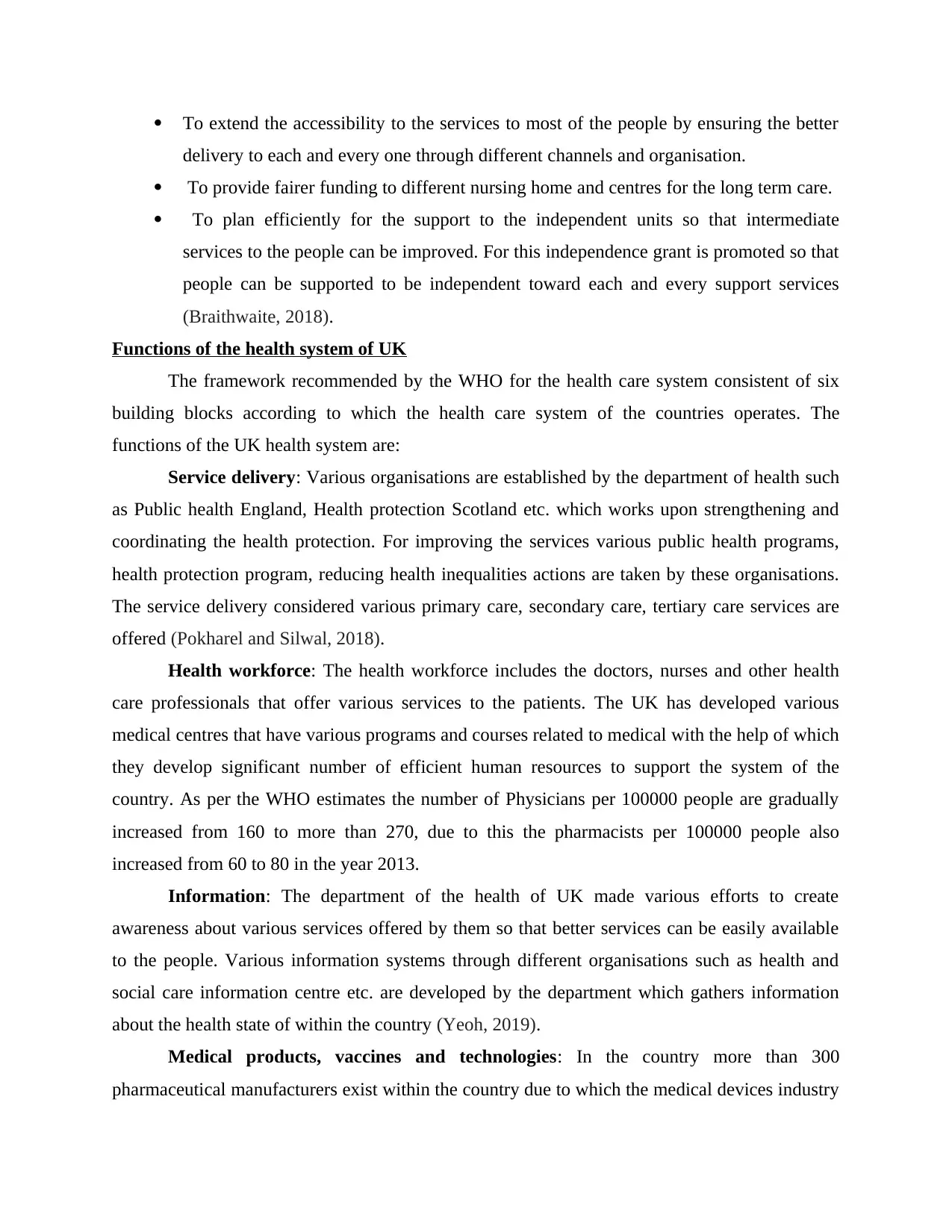
To extend the accessibility to the services to most of the people by ensuring the better
delivery to each and every one through different channels and organisation.
To provide fairer funding to different nursing home and centres for the long term care.
To plan efficiently for the support to the independent units so that intermediate
services to the people can be improved. For this independence grant is promoted so that
people can be supported to be independent toward each and every support services
(Braithwaite, 2018).
Functions of the health system of UK
The framework recommended by the WHO for the health care system consistent of six
building blocks according to which the health care system of the countries operates. The
functions of the UK health system are:
Service delivery: Various organisations are established by the department of health such
as Public health England, Health protection Scotland etc. which works upon strengthening and
coordinating the health protection. For improving the services various public health programs,
health protection program, reducing health inequalities actions are taken by these organisations.
The service delivery considered various primary care, secondary care, tertiary care services are
offered (Pokharel and Silwal, 2018).
Health workforce: The health workforce includes the doctors, nurses and other health
care professionals that offer various services to the patients. The UK has developed various
medical centres that have various programs and courses related to medical with the help of which
they develop significant number of efficient human resources to support the system of the
country. As per the WHO estimates the number of Physicians per 100000 people are gradually
increased from 160 to more than 270, due to this the pharmacists per 100000 people also
increased from 60 to 80 in the year 2013.
Information: The department of the health of UK made various efforts to create
awareness about various services offered by them so that better services can be easily available
to the people. Various information systems through different organisations such as health and
social care information centre etc. are developed by the department which gathers information
about the health state of within the country (Yeoh, 2019).
Medical products, vaccines and technologies: In the country more than 300
pharmaceutical manufacturers exist within the country due to which the medical devices industry
delivery to each and every one through different channels and organisation.
To provide fairer funding to different nursing home and centres for the long term care.
To plan efficiently for the support to the independent units so that intermediate
services to the people can be improved. For this independence grant is promoted so that
people can be supported to be independent toward each and every support services
(Braithwaite, 2018).
Functions of the health system of UK
The framework recommended by the WHO for the health care system consistent of six
building blocks according to which the health care system of the countries operates. The
functions of the UK health system are:
Service delivery: Various organisations are established by the department of health such
as Public health England, Health protection Scotland etc. which works upon strengthening and
coordinating the health protection. For improving the services various public health programs,
health protection program, reducing health inequalities actions are taken by these organisations.
The service delivery considered various primary care, secondary care, tertiary care services are
offered (Pokharel and Silwal, 2018).
Health workforce: The health workforce includes the doctors, nurses and other health
care professionals that offer various services to the patients. The UK has developed various
medical centres that have various programs and courses related to medical with the help of which
they develop significant number of efficient human resources to support the system of the
country. As per the WHO estimates the number of Physicians per 100000 people are gradually
increased from 160 to more than 270, due to this the pharmacists per 100000 people also
increased from 60 to 80 in the year 2013.
Information: The department of the health of UK made various efforts to create
awareness about various services offered by them so that better services can be easily available
to the people. Various information systems through different organisations such as health and
social care information centre etc. are developed by the department which gathers information
about the health state of within the country (Yeoh, 2019).
Medical products, vaccines and technologies: In the country more than 300
pharmaceutical manufacturers exist within the country due to which the medical devices industry
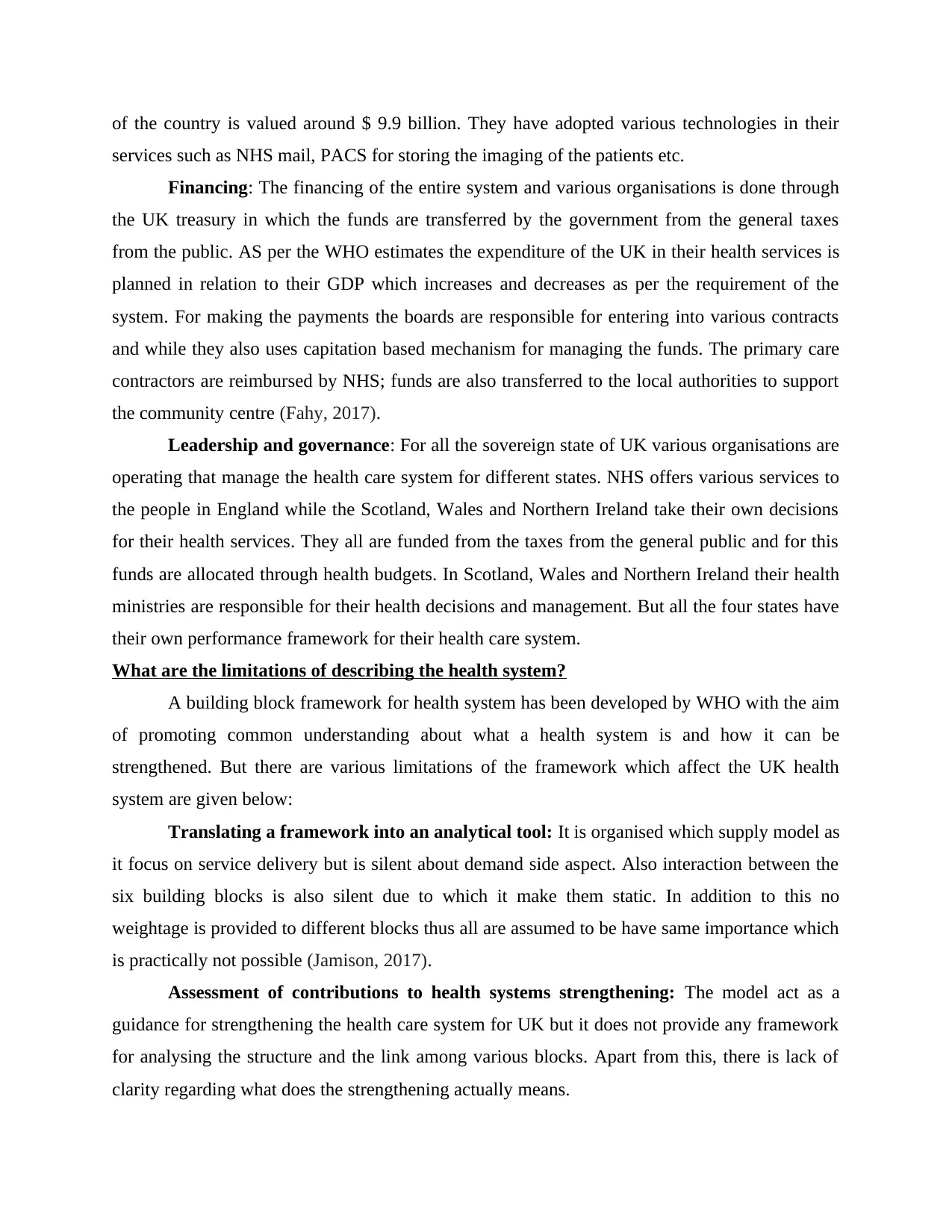
of the country is valued around $ 9.9 billion. They have adopted various technologies in their
services such as NHS mail, PACS for storing the imaging of the patients etc.
Financing: The financing of the entire system and various organisations is done through
the UK treasury in which the funds are transferred by the government from the general taxes
from the public. AS per the WHO estimates the expenditure of the UK in their health services is
planned in relation to their GDP which increases and decreases as per the requirement of the
system. For making the payments the boards are responsible for entering into various contracts
and while they also uses capitation based mechanism for managing the funds. The primary care
contractors are reimbursed by NHS; funds are also transferred to the local authorities to support
the community centre (Fahy, 2017).
Leadership and governance: For all the sovereign state of UK various organisations are
operating that manage the health care system for different states. NHS offers various services to
the people in England while the Scotland, Wales and Northern Ireland take their own decisions
for their health services. They all are funded from the taxes from the general public and for this
funds are allocated through health budgets. In Scotland, Wales and Northern Ireland their health
ministries are responsible for their health decisions and management. But all the four states have
their own performance framework for their health care system.
What are the limitations of describing the health system?
A building block framework for health system has been developed by WHO with the aim
of promoting common understanding about what a health system is and how it can be
strengthened. But there are various limitations of the framework which affect the UK health
system are given below:
Translating a framework into an analytical tool: It is organised which supply model as
it focus on service delivery but is silent about demand side aspect. Also interaction between the
six building blocks is also silent due to which it make them static. In addition to this no
weightage is provided to different blocks thus all are assumed to be have same importance which
is practically not possible (Jamison, 2017).
Assessment of contributions to health systems strengthening: The model act as a
guidance for strengthening the health care system for UK but it does not provide any framework
for analysing the structure and the link among various blocks. Apart from this, there is lack of
clarity regarding what does the strengthening actually means.
services such as NHS mail, PACS for storing the imaging of the patients etc.
Financing: The financing of the entire system and various organisations is done through
the UK treasury in which the funds are transferred by the government from the general taxes
from the public. AS per the WHO estimates the expenditure of the UK in their health services is
planned in relation to their GDP which increases and decreases as per the requirement of the
system. For making the payments the boards are responsible for entering into various contracts
and while they also uses capitation based mechanism for managing the funds. The primary care
contractors are reimbursed by NHS; funds are also transferred to the local authorities to support
the community centre (Fahy, 2017).
Leadership and governance: For all the sovereign state of UK various organisations are
operating that manage the health care system for different states. NHS offers various services to
the people in England while the Scotland, Wales and Northern Ireland take their own decisions
for their health services. They all are funded from the taxes from the general public and for this
funds are allocated through health budgets. In Scotland, Wales and Northern Ireland their health
ministries are responsible for their health decisions and management. But all the four states have
their own performance framework for their health care system.
What are the limitations of describing the health system?
A building block framework for health system has been developed by WHO with the aim
of promoting common understanding about what a health system is and how it can be
strengthened. But there are various limitations of the framework which affect the UK health
system are given below:
Translating a framework into an analytical tool: It is organised which supply model as
it focus on service delivery but is silent about demand side aspect. Also interaction between the
six building blocks is also silent due to which it make them static. In addition to this no
weightage is provided to different blocks thus all are assumed to be have same importance which
is practically not possible (Jamison, 2017).
Assessment of contributions to health systems strengthening: The model act as a
guidance for strengthening the health care system for UK but it does not provide any framework
for analysing the structure and the link among various blocks. Apart from this, there is lack of
clarity regarding what does the strengthening actually means.
⊘ This is a preview!⊘
Do you want full access?
Subscribe today to unlock all pages.

Trusted by 1+ million students worldwide
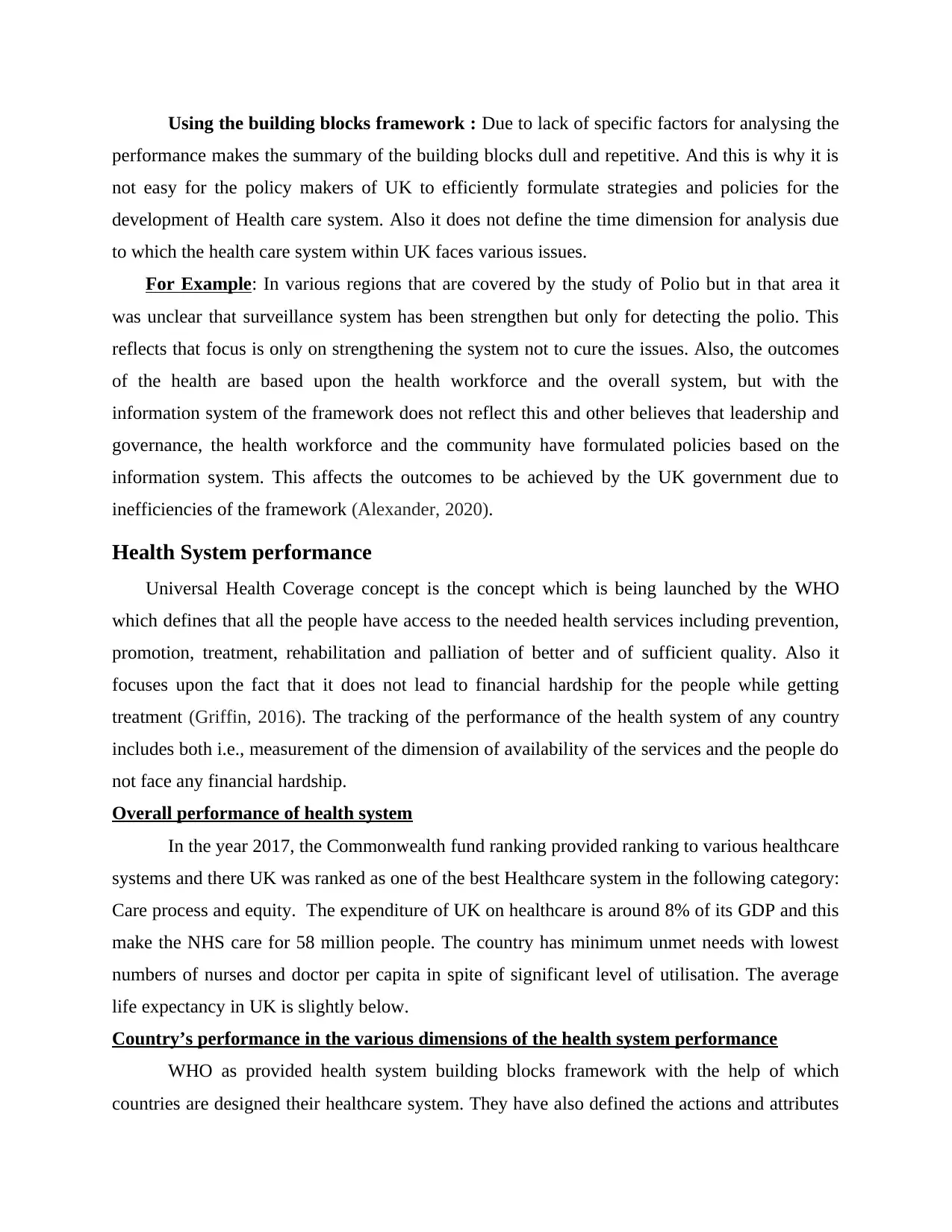
Using the building blocks framework : Due to lack of specific factors for analysing the
performance makes the summary of the building blocks dull and repetitive. And this is why it is
not easy for the policy makers of UK to efficiently formulate strategies and policies for the
development of Health care system. Also it does not define the time dimension for analysis due
to which the health care system within UK faces various issues.
For Example: In various regions that are covered by the study of Polio but in that area it
was unclear that surveillance system has been strengthen but only for detecting the polio. This
reflects that focus is only on strengthening the system not to cure the issues. Also, the outcomes
of the health are based upon the health workforce and the overall system, but with the
information system of the framework does not reflect this and other believes that leadership and
governance, the health workforce and the community have formulated policies based on the
information system. This affects the outcomes to be achieved by the UK government due to
inefficiencies of the framework (Alexander, 2020).
Health System performance
Universal Health Coverage concept is the concept which is being launched by the WHO
which defines that all the people have access to the needed health services including prevention,
promotion, treatment, rehabilitation and palliation of better and of sufficient quality. Also it
focuses upon the fact that it does not lead to financial hardship for the people while getting
treatment (Griffin, 2016). The tracking of the performance of the health system of any country
includes both i.e., measurement of the dimension of availability of the services and the people do
not face any financial hardship.
Overall performance of health system
In the year 2017, the Commonwealth fund ranking provided ranking to various healthcare
systems and there UK was ranked as one of the best Healthcare system in the following category:
Care process and equity. The expenditure of UK on healthcare is around 8% of its GDP and this
make the NHS care for 58 million people. The country has minimum unmet needs with lowest
numbers of nurses and doctor per capita in spite of significant level of utilisation. The average
life expectancy in UK is slightly below.
Country’s performance in the various dimensions of the health system performance
WHO as provided health system building blocks framework with the help of which
countries are designed their healthcare system. They have also defined the actions and attributes
performance makes the summary of the building blocks dull and repetitive. And this is why it is
not easy for the policy makers of UK to efficiently formulate strategies and policies for the
development of Health care system. Also it does not define the time dimension for analysis due
to which the health care system within UK faces various issues.
For Example: In various regions that are covered by the study of Polio but in that area it
was unclear that surveillance system has been strengthen but only for detecting the polio. This
reflects that focus is only on strengthening the system not to cure the issues. Also, the outcomes
of the health are based upon the health workforce and the overall system, but with the
information system of the framework does not reflect this and other believes that leadership and
governance, the health workforce and the community have formulated policies based on the
information system. This affects the outcomes to be achieved by the UK government due to
inefficiencies of the framework (Alexander, 2020).
Health System performance
Universal Health Coverage concept is the concept which is being launched by the WHO
which defines that all the people have access to the needed health services including prevention,
promotion, treatment, rehabilitation and palliation of better and of sufficient quality. Also it
focuses upon the fact that it does not lead to financial hardship for the people while getting
treatment (Griffin, 2016). The tracking of the performance of the health system of any country
includes both i.e., measurement of the dimension of availability of the services and the people do
not face any financial hardship.
Overall performance of health system
In the year 2017, the Commonwealth fund ranking provided ranking to various healthcare
systems and there UK was ranked as one of the best Healthcare system in the following category:
Care process and equity. The expenditure of UK on healthcare is around 8% of its GDP and this
make the NHS care for 58 million people. The country has minimum unmet needs with lowest
numbers of nurses and doctor per capita in spite of significant level of utilisation. The average
life expectancy in UK is slightly below.
Country’s performance in the various dimensions of the health system performance
WHO as provided health system building blocks framework with the help of which
countries are designed their healthcare system. They have also defined the actions and attributes
Paraphrase This Document
Need a fresh take? Get an instant paraphrase of this document with our AI Paraphraser
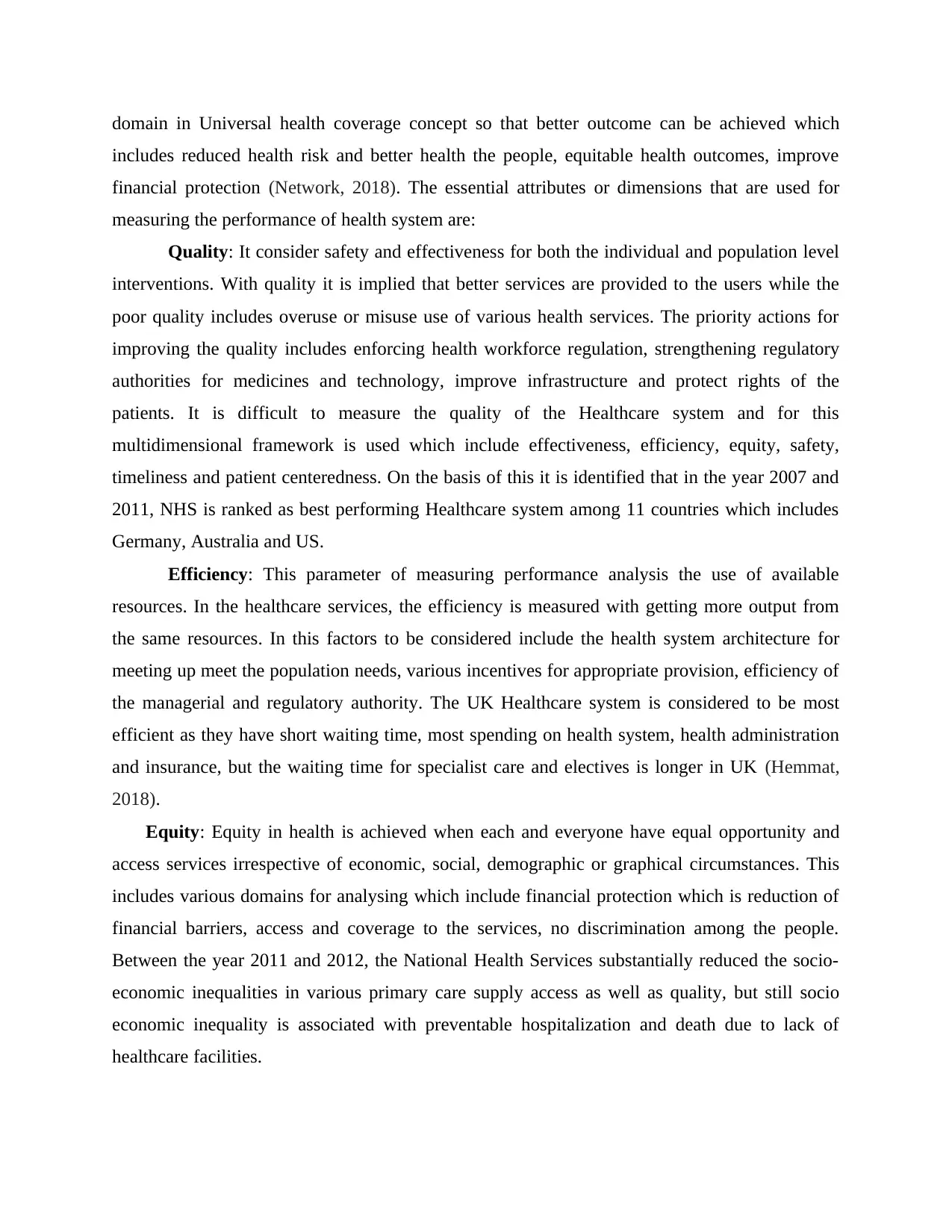
domain in Universal health coverage concept so that better outcome can be achieved which
includes reduced health risk and better health the people, equitable health outcomes, improve
financial protection (Network, 2018). The essential attributes or dimensions that are used for
measuring the performance of health system are:
Quality: It consider safety and effectiveness for both the individual and population level
interventions. With quality it is implied that better services are provided to the users while the
poor quality includes overuse or misuse use of various health services. The priority actions for
improving the quality includes enforcing health workforce regulation, strengthening regulatory
authorities for medicines and technology, improve infrastructure and protect rights of the
patients. It is difficult to measure the quality of the Healthcare system and for this
multidimensional framework is used which include effectiveness, efficiency, equity, safety,
timeliness and patient centeredness. On the basis of this it is identified that in the year 2007 and
2011, NHS is ranked as best performing Healthcare system among 11 countries which includes
Germany, Australia and US.
Efficiency: This parameter of measuring performance analysis the use of available
resources. In the healthcare services, the efficiency is measured with getting more output from
the same resources. In this factors to be considered include the health system architecture for
meeting up meet the population needs, various incentives for appropriate provision, efficiency of
the managerial and regulatory authority. The UK Healthcare system is considered to be most
efficient as they have short waiting time, most spending on health system, health administration
and insurance, but the waiting time for specialist care and electives is longer in UK (Hemmat,
2018).
Equity: Equity in health is achieved when each and everyone have equal opportunity and
access services irrespective of economic, social, demographic or graphical circumstances. This
includes various domains for analysing which include financial protection which is reduction of
financial barriers, access and coverage to the services, no discrimination among the people.
Between the year 2011 and 2012, the National Health Services substantially reduced the socio-
economic inequalities in various primary care supply access as well as quality, but still socio
economic inequality is associated with preventable hospitalization and death due to lack of
healthcare facilities.
includes reduced health risk and better health the people, equitable health outcomes, improve
financial protection (Network, 2018). The essential attributes or dimensions that are used for
measuring the performance of health system are:
Quality: It consider safety and effectiveness for both the individual and population level
interventions. With quality it is implied that better services are provided to the users while the
poor quality includes overuse or misuse use of various health services. The priority actions for
improving the quality includes enforcing health workforce regulation, strengthening regulatory
authorities for medicines and technology, improve infrastructure and protect rights of the
patients. It is difficult to measure the quality of the Healthcare system and for this
multidimensional framework is used which include effectiveness, efficiency, equity, safety,
timeliness and patient centeredness. On the basis of this it is identified that in the year 2007 and
2011, NHS is ranked as best performing Healthcare system among 11 countries which includes
Germany, Australia and US.
Efficiency: This parameter of measuring performance analysis the use of available
resources. In the healthcare services, the efficiency is measured with getting more output from
the same resources. In this factors to be considered include the health system architecture for
meeting up meet the population needs, various incentives for appropriate provision, efficiency of
the managerial and regulatory authority. The UK Healthcare system is considered to be most
efficient as they have short waiting time, most spending on health system, health administration
and insurance, but the waiting time for specialist care and electives is longer in UK (Hemmat,
2018).
Equity: Equity in health is achieved when each and everyone have equal opportunity and
access services irrespective of economic, social, demographic or graphical circumstances. This
includes various domains for analysing which include financial protection which is reduction of
financial barriers, access and coverage to the services, no discrimination among the people.
Between the year 2011 and 2012, the National Health Services substantially reduced the socio-
economic inequalities in various primary care supply access as well as quality, but still socio
economic inequality is associated with preventable hospitalization and death due to lack of
healthcare facilities.
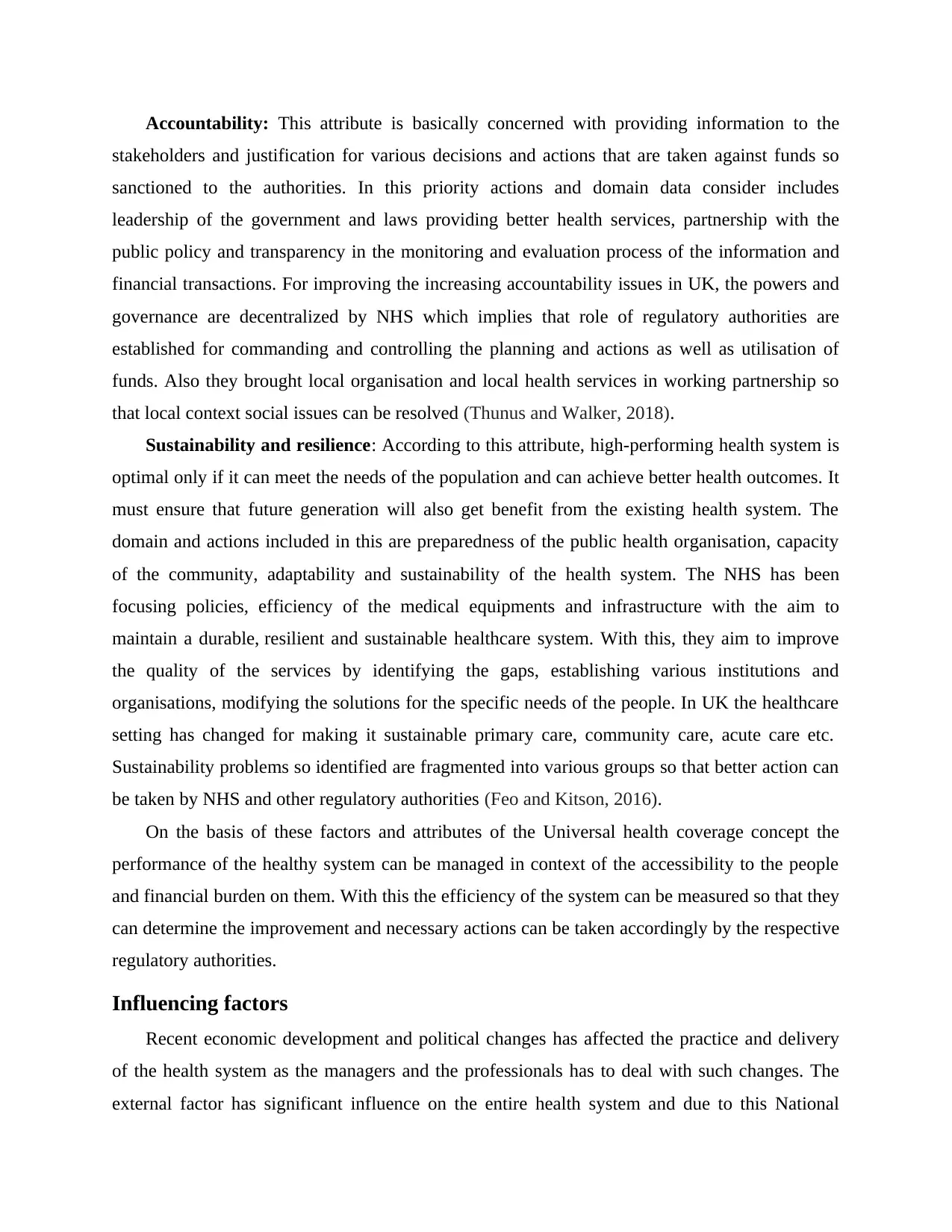
Accountability: This attribute is basically concerned with providing information to the
stakeholders and justification for various decisions and actions that are taken against funds so
sanctioned to the authorities. In this priority actions and domain data consider includes
leadership of the government and laws providing better health services, partnership with the
public policy and transparency in the monitoring and evaluation process of the information and
financial transactions. For improving the increasing accountability issues in UK, the powers and
governance are decentralized by NHS which implies that role of regulatory authorities are
established for commanding and controlling the planning and actions as well as utilisation of
funds. Also they brought local organisation and local health services in working partnership so
that local context social issues can be resolved (Thunus and Walker, 2018).
Sustainability and resilience: According to this attribute, high-performing health system is
optimal only if it can meet the needs of the population and can achieve better health outcomes. It
must ensure that future generation will also get benefit from the existing health system. The
domain and actions included in this are preparedness of the public health organisation, capacity
of the community, adaptability and sustainability of the health system. The NHS has been
focusing policies, efficiency of the medical equipments and infrastructure with the aim to
maintain a durable, resilient and sustainable healthcare system. With this, they aim to improve
the quality of the services by identifying the gaps, establishing various institutions and
organisations, modifying the solutions for the specific needs of the people. In UK the healthcare
setting has changed for making it sustainable primary care, community care, acute care etc.
Sustainability problems so identified are fragmented into various groups so that better action can
be taken by NHS and other regulatory authorities (Feo and Kitson, 2016).
On the basis of these factors and attributes of the Universal health coverage concept the
performance of the healthy system can be managed in context of the accessibility to the people
and financial burden on them. With this the efficiency of the system can be measured so that they
can determine the improvement and necessary actions can be taken accordingly by the respective
regulatory authorities.
Influencing factors
Recent economic development and political changes has affected the practice and delivery
of the health system as the managers and the professionals has to deal with such changes. The
external factor has significant influence on the entire health system and due to this National
stakeholders and justification for various decisions and actions that are taken against funds so
sanctioned to the authorities. In this priority actions and domain data consider includes
leadership of the government and laws providing better health services, partnership with the
public policy and transparency in the monitoring and evaluation process of the information and
financial transactions. For improving the increasing accountability issues in UK, the powers and
governance are decentralized by NHS which implies that role of regulatory authorities are
established for commanding and controlling the planning and actions as well as utilisation of
funds. Also they brought local organisation and local health services in working partnership so
that local context social issues can be resolved (Thunus and Walker, 2018).
Sustainability and resilience: According to this attribute, high-performing health system is
optimal only if it can meet the needs of the population and can achieve better health outcomes. It
must ensure that future generation will also get benefit from the existing health system. The
domain and actions included in this are preparedness of the public health organisation, capacity
of the community, adaptability and sustainability of the health system. The NHS has been
focusing policies, efficiency of the medical equipments and infrastructure with the aim to
maintain a durable, resilient and sustainable healthcare system. With this, they aim to improve
the quality of the services by identifying the gaps, establishing various institutions and
organisations, modifying the solutions for the specific needs of the people. In UK the healthcare
setting has changed for making it sustainable primary care, community care, acute care etc.
Sustainability problems so identified are fragmented into various groups so that better action can
be taken by NHS and other regulatory authorities (Feo and Kitson, 2016).
On the basis of these factors and attributes of the Universal health coverage concept the
performance of the healthy system can be managed in context of the accessibility to the people
and financial burden on them. With this the efficiency of the system can be measured so that they
can determine the improvement and necessary actions can be taken accordingly by the respective
regulatory authorities.
Influencing factors
Recent economic development and political changes has affected the practice and delivery
of the health system as the managers and the professionals has to deal with such changes. The
external factor has significant influence on the entire health system and due to this National
⊘ This is a preview!⊘
Do you want full access?
Subscribe today to unlock all pages.

Trusted by 1+ million students worldwide
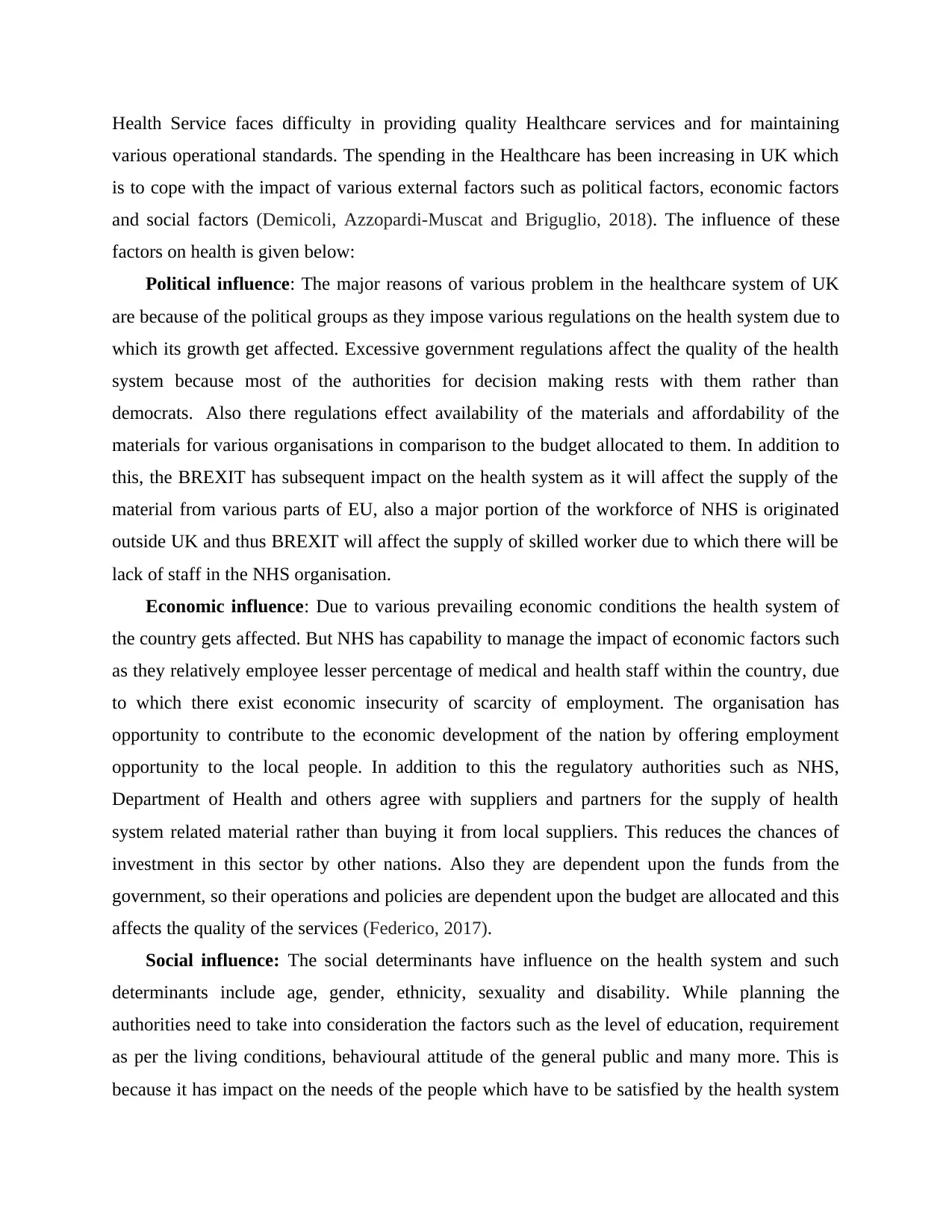
Health Service faces difficulty in providing quality Healthcare services and for maintaining
various operational standards. The spending in the Healthcare has been increasing in UK which
is to cope with the impact of various external factors such as political factors, economic factors
and social factors (Demicoli, Azzopardi-Muscat and Briguglio, 2018). The influence of these
factors on health is given below:
Political influence: The major reasons of various problem in the healthcare system of UK
are because of the political groups as they impose various regulations on the health system due to
which its growth get affected. Excessive government regulations affect the quality of the health
system because most of the authorities for decision making rests with them rather than
democrats. Also there regulations effect availability of the materials and affordability of the
materials for various organisations in comparison to the budget allocated to them. In addition to
this, the BREXIT has subsequent impact on the health system as it will affect the supply of the
material from various parts of EU, also a major portion of the workforce of NHS is originated
outside UK and thus BREXIT will affect the supply of skilled worker due to which there will be
lack of staff in the NHS organisation.
Economic influence: Due to various prevailing economic conditions the health system of
the country gets affected. But NHS has capability to manage the impact of economic factors such
as they relatively employee lesser percentage of medical and health staff within the country, due
to which there exist economic insecurity of scarcity of employment. The organisation has
opportunity to contribute to the economic development of the nation by offering employment
opportunity to the local people. In addition to this the regulatory authorities such as NHS,
Department of Health and others agree with suppliers and partners for the supply of health
system related material rather than buying it from local suppliers. This reduces the chances of
investment in this sector by other nations. Also they are dependent upon the funds from the
government, so their operations and policies are dependent upon the budget are allocated and this
affects the quality of the services (Federico, 2017).
Social influence: The social determinants have influence on the health system and such
determinants include age, gender, ethnicity, sexuality and disability. While planning the
authorities need to take into consideration the factors such as the level of education, requirement
as per the living conditions, behavioural attitude of the general public and many more. This is
because it has impact on the needs of the people which have to be satisfied by the health system
various operational standards. The spending in the Healthcare has been increasing in UK which
is to cope with the impact of various external factors such as political factors, economic factors
and social factors (Demicoli, Azzopardi-Muscat and Briguglio, 2018). The influence of these
factors on health is given below:
Political influence: The major reasons of various problem in the healthcare system of UK
are because of the political groups as they impose various regulations on the health system due to
which its growth get affected. Excessive government regulations affect the quality of the health
system because most of the authorities for decision making rests with them rather than
democrats. Also there regulations effect availability of the materials and affordability of the
materials for various organisations in comparison to the budget allocated to them. In addition to
this, the BREXIT has subsequent impact on the health system as it will affect the supply of the
material from various parts of EU, also a major portion of the workforce of NHS is originated
outside UK and thus BREXIT will affect the supply of skilled worker due to which there will be
lack of staff in the NHS organisation.
Economic influence: Due to various prevailing economic conditions the health system of
the country gets affected. But NHS has capability to manage the impact of economic factors such
as they relatively employee lesser percentage of medical and health staff within the country, due
to which there exist economic insecurity of scarcity of employment. The organisation has
opportunity to contribute to the economic development of the nation by offering employment
opportunity to the local people. In addition to this the regulatory authorities such as NHS,
Department of Health and others agree with suppliers and partners for the supply of health
system related material rather than buying it from local suppliers. This reduces the chances of
investment in this sector by other nations. Also they are dependent upon the funds from the
government, so their operations and policies are dependent upon the budget are allocated and this
affects the quality of the services (Federico, 2017).
Social influence: The social determinants have influence on the health system and such
determinants include age, gender, ethnicity, sexuality and disability. While planning the
authorities need to take into consideration the factors such as the level of education, requirement
as per the living conditions, behavioural attitude of the general public and many more. This is
because it has impact on the needs of the people which have to be satisfied by the health system
Paraphrase This Document
Need a fresh take? Get an instant paraphrase of this document with our AI Paraphraser
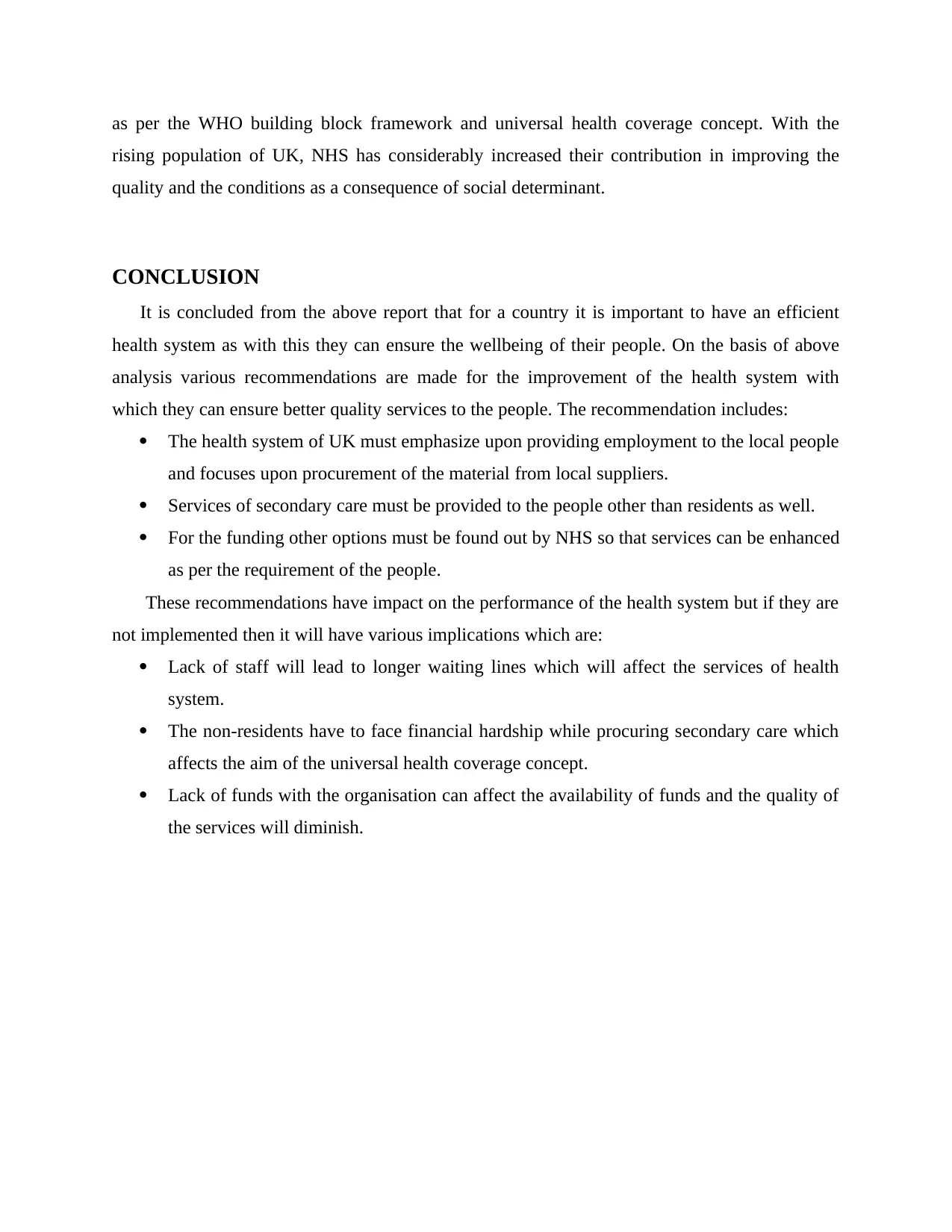
as per the WHO building block framework and universal health coverage concept. With the
rising population of UK, NHS has considerably increased their contribution in improving the
quality and the conditions as a consequence of social determinant.
CONCLUSION
It is concluded from the above report that for a country it is important to have an efficient
health system as with this they can ensure the wellbeing of their people. On the basis of above
analysis various recommendations are made for the improvement of the health system with
which they can ensure better quality services to the people. The recommendation includes:
The health system of UK must emphasize upon providing employment to the local people
and focuses upon procurement of the material from local suppliers.
Services of secondary care must be provided to the people other than residents as well.
For the funding other options must be found out by NHS so that services can be enhanced
as per the requirement of the people.
These recommendations have impact on the performance of the health system but if they are
not implemented then it will have various implications which are:
Lack of staff will lead to longer waiting lines which will affect the services of health
system.
The non-residents have to face financial hardship while procuring secondary care which
affects the aim of the universal health coverage concept.
Lack of funds with the organisation can affect the availability of funds and the quality of
the services will diminish.
rising population of UK, NHS has considerably increased their contribution in improving the
quality and the conditions as a consequence of social determinant.
CONCLUSION
It is concluded from the above report that for a country it is important to have an efficient
health system as with this they can ensure the wellbeing of their people. On the basis of above
analysis various recommendations are made for the improvement of the health system with
which they can ensure better quality services to the people. The recommendation includes:
The health system of UK must emphasize upon providing employment to the local people
and focuses upon procurement of the material from local suppliers.
Services of secondary care must be provided to the people other than residents as well.
For the funding other options must be found out by NHS so that services can be enhanced
as per the requirement of the people.
These recommendations have impact on the performance of the health system but if they are
not implemented then it will have various implications which are:
Lack of staff will lead to longer waiting lines which will affect the services of health
system.
The non-residents have to face financial hardship while procuring secondary care which
affects the aim of the universal health coverage concept.
Lack of funds with the organisation can affect the availability of funds and the quality of
the services will diminish.
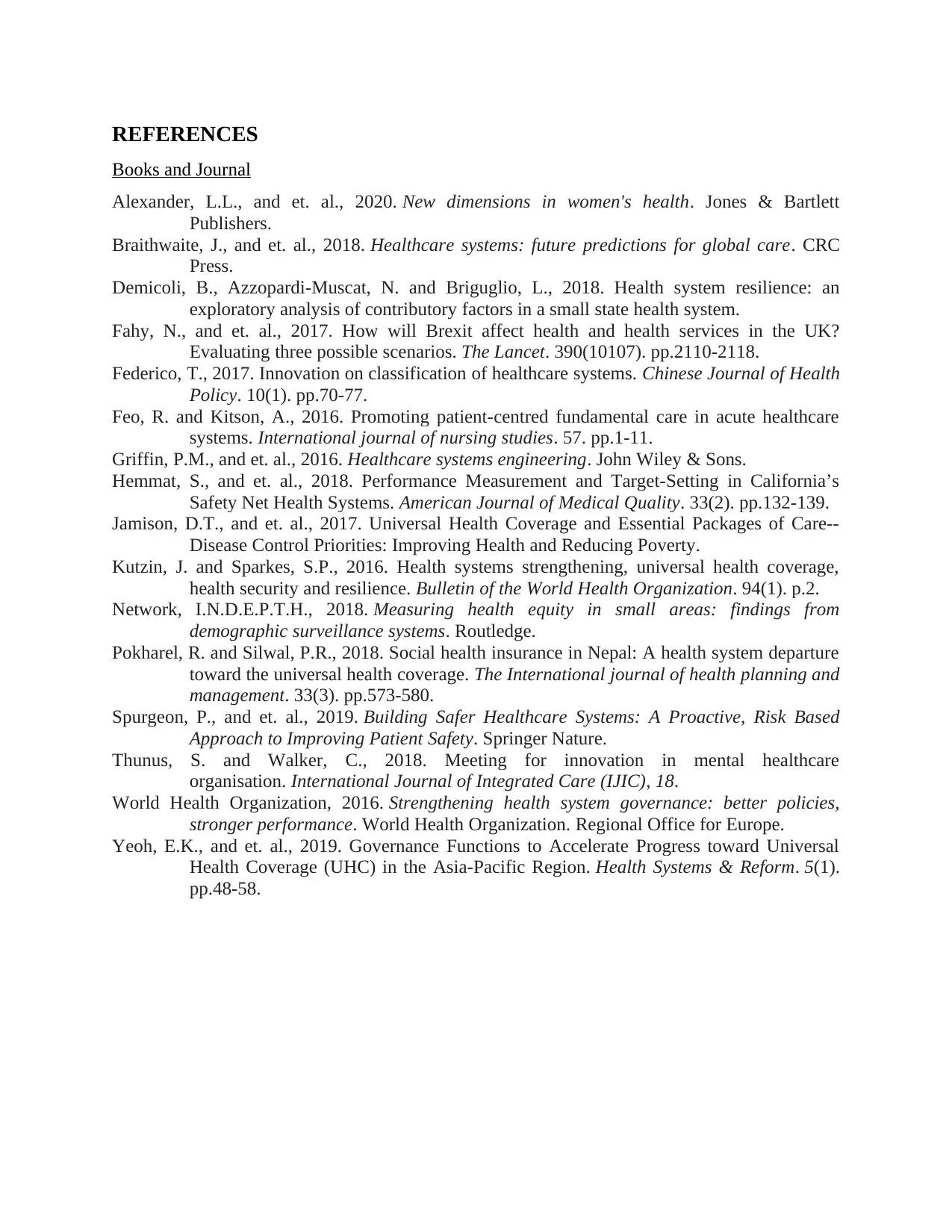
REFERENCES
Books and Journal
Alexander, L.L., and et. al., 2020. New dimensions in women's health. Jones & Bartlett
Publishers.
Braithwaite, J., and et. al., 2018. Healthcare systems: future predictions for global care. CRC
Press.
Demicoli, B., Azzopardi-Muscat, N. and Briguglio, L., 2018. Health system resilience: an
exploratory analysis of contributory factors in a small state health system.
Fahy, N., and et. al., 2017. How will Brexit affect health and health services in the UK?
Evaluating three possible scenarios. The Lancet. 390(10107). pp.2110-2118.
Federico, T., 2017. Innovation on classification of healthcare systems. Chinese Journal of Health
Policy. 10(1). pp.70-77.
Feo, R. and Kitson, A., 2016. Promoting patient-centred fundamental care in acute healthcare
systems. International journal of nursing studies. 57. pp.1-11.
Griffin, P.M., and et. al., 2016. Healthcare systems engineering. John Wiley & Sons.
Hemmat, S., and et. al., 2018. Performance Measurement and Target-Setting in California’s
Safety Net Health Systems. American Journal of Medical Quality. 33(2). pp.132-139.
Jamison, D.T., and et. al., 2017. Universal Health Coverage and Essential Packages of Care--
Disease Control Priorities: Improving Health and Reducing Poverty.
Kutzin, J. and Sparkes, S.P., 2016. Health systems strengthening, universal health coverage,
health security and resilience. Bulletin of the World Health Organization. 94(1). p.2.
Network, I.N.D.E.P.T.H., 2018. Measuring health equity in small areas: findings from
demographic surveillance systems. Routledge.
Pokharel, R. and Silwal, P.R., 2018. Social health insurance in Nepal: A health system departure
toward the universal health coverage. The International journal of health planning and
management. 33(3). pp.573-580.
Spurgeon, P., and et. al., 2019. Building Safer Healthcare Systems: A Proactive, Risk Based
Approach to Improving Patient Safety. Springer Nature.
Thunus, S. and Walker, C., 2018. Meeting for innovation in mental healthcare
organisation. International Journal of Integrated Care (IJIC), 18.
World Health Organization, 2016. Strengthening health system governance: better policies,
stronger performance. World Health Organization. Regional Office for Europe.
Yeoh, E.K., and et. al., 2019. Governance Functions to Accelerate Progress toward Universal
Health Coverage (UHC) in the Asia-Pacific Region. Health Systems & Reform. 5(1).
pp.48-58.
Books and Journal
Alexander, L.L., and et. al., 2020. New dimensions in women's health. Jones & Bartlett
Publishers.
Braithwaite, J., and et. al., 2018. Healthcare systems: future predictions for global care. CRC
Press.
Demicoli, B., Azzopardi-Muscat, N. and Briguglio, L., 2018. Health system resilience: an
exploratory analysis of contributory factors in a small state health system.
Fahy, N., and et. al., 2017. How will Brexit affect health and health services in the UK?
Evaluating three possible scenarios. The Lancet. 390(10107). pp.2110-2118.
Federico, T., 2017. Innovation on classification of healthcare systems. Chinese Journal of Health
Policy. 10(1). pp.70-77.
Feo, R. and Kitson, A., 2016. Promoting patient-centred fundamental care in acute healthcare
systems. International journal of nursing studies. 57. pp.1-11.
Griffin, P.M., and et. al., 2016. Healthcare systems engineering. John Wiley & Sons.
Hemmat, S., and et. al., 2018. Performance Measurement and Target-Setting in California’s
Safety Net Health Systems. American Journal of Medical Quality. 33(2). pp.132-139.
Jamison, D.T., and et. al., 2017. Universal Health Coverage and Essential Packages of Care--
Disease Control Priorities: Improving Health and Reducing Poverty.
Kutzin, J. and Sparkes, S.P., 2016. Health systems strengthening, universal health coverage,
health security and resilience. Bulletin of the World Health Organization. 94(1). p.2.
Network, I.N.D.E.P.T.H., 2018. Measuring health equity in small areas: findings from
demographic surveillance systems. Routledge.
Pokharel, R. and Silwal, P.R., 2018. Social health insurance in Nepal: A health system departure
toward the universal health coverage. The International journal of health planning and
management. 33(3). pp.573-580.
Spurgeon, P., and et. al., 2019. Building Safer Healthcare Systems: A Proactive, Risk Based
Approach to Improving Patient Safety. Springer Nature.
Thunus, S. and Walker, C., 2018. Meeting for innovation in mental healthcare
organisation. International Journal of Integrated Care (IJIC), 18.
World Health Organization, 2016. Strengthening health system governance: better policies,
stronger performance. World Health Organization. Regional Office for Europe.
Yeoh, E.K., and et. al., 2019. Governance Functions to Accelerate Progress toward Universal
Health Coverage (UHC) in the Asia-Pacific Region. Health Systems & Reform. 5(1).
pp.48-58.
⊘ This is a preview!⊘
Do you want full access?
Subscribe today to unlock all pages.

Trusted by 1+ million students worldwide
1 out of 12
Related Documents
Your All-in-One AI-Powered Toolkit for Academic Success.
+13062052269
info@desklib.com
Available 24*7 on WhatsApp / Email
![[object Object]](/_next/static/media/star-bottom.7253800d.svg)
Unlock your academic potential
Copyright © 2020–2025 A2Z Services. All Rights Reserved. Developed and managed by ZUCOL.





